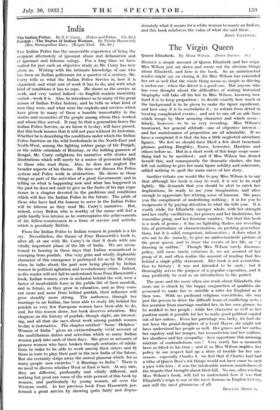The Virgin Queen
Queen Elizabeth. By Mona Wilson. (Peter Davies. 5s.)
MERELY a simple account of Queen Elizabeth and her reign. Miss Wilson just sat down and wrote out the obvious things about Elizabeth, and here is the book. So an uninstructed reader might say on closing it, for Miss Wilson has concealed her art so well that the whole thing seems as simple as driving a motor-car—when the driver is a good one. But anyone who has ever thought about the difficulties of writing historical biography will take off his hat to Miss Wilson, knowing how hard it is to keep proportion ; to decide exactly how much of the background is to be given to make the figure significant, and how easy it is to overwhelm it ; to refrain from detail in treating complicated events ; and not to run off on side lines which tempt by their amusing character and which seem— falsely, however—to be so very revealing. Miss Wilson's treatment, her general attitude—one of objective interest— and her maintenance of proportion are all admirable. If we have a complaint it is that she has a little neglected subsidiary figures. We feel we should have liked a few short trenchant phrases putting Burghley, Essex, Leicester, Hawkins and others before us. But in a short work of this large scope some- thing had to be sacrificed ; and if Miss Wilson has denied herself this, and consequently the dramatic clashes, she has left out nothing to give her main figure solidity and coherence, added nothing to spoil the main curve of her story.
Another tribute one would like to pay Miss Wilson is to say that although her book is easy to read, it is not to be read lightly. She demands that you should be alert to catch her implications, be ready to use your imagination, and alive enough to appreciate her retiring sense of humour. She pays you the compliment of underlining nothing ; it is for you to reciprocate it by paying attention to what she tells you. It is worth while, for Elizabeth emerges whole, with her strength and her crafty vacillations, her powers and her limitations, her masculine grasp, and her feminine vanities. Not that this book is a work of genius ; it has no lightning flashes nor revealing bits of portraiture or characterization, no probing generaliza- tions, but it is solid, competent, informative ; it does what it sets out to do—namely, to give an understandable picture of the great queen, and to trace the events of her life, as " a drawing in outline." Though Miss Wilson rarely discusses policy, still more rarely criticizes it, we are assured of her grasp of it, and often realize the amount of reading that lies behind a single pithy statement. Her book is not a contribu- tion to history ; it was not intended to be such ; but it thoroughly serves the purpose of a popular exposition, and it may profitably be read as an introduction to the period.
The more and the more often one reads about Elizabeth, the more one is struck by the happy conjunction of qualities she possessed to make her so suitable a ruler for England as it then was. With no profound religious convictions, she was just the person to drive the difficult team of conflicting sects ; her aversion from marriage enabled her, in her own phrase, to be wedded to her people ; while her character as well as her position made it possible for her to make good political capital out of her suitors. Even her parentage was lucky, for had she not been the grand-daughter of a Lord Mayor, she might not have understood her people so well. Her graces and her oaths, her cajolery and her temper, her romanticism and her realism, her aloofness and her sympathy—how opportune this amazing mixture of contradictions was ! Very rarely has a monarch been so fitted to his time ; and if, as Miss Wilson implies, her policy in one respect laid up a store of trouble for her suc- cessors—especially Charles I—we feel that if Charles had had a tithe of Queen Bess's wit things would not have come to such a pass with him : it was the intolerable narrow-mindedness of the Stuarts that brought about their fall. No one, after reading Miss Wilson's book, will fail to understand how it was that Elizabeth's reign is one of the most famous in English history, and still the most glamorous of all.






























 Previous page
Previous page